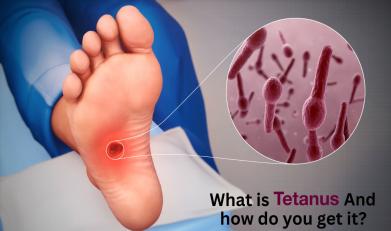

23 Jul, 2024
Tetanus, often referred to as "lockjaw," is a serious bacterial infection that affects the nervous system, leading to painful muscle contractions. It's a condition that everyone should be aware of due to its potential severity and the importance of timely intervention. In this blog post, we'll explore what tetanus is, how it spreads, the symptoms to look out for, and the best ways to prevent it.
Tetanus is caused by the bacterium Clostridium tetani. The spores of this bacterium are commonly found in soil, dust, and animal feces. When these spores enter the body through a wound or cut, they can produce a toxin that affects the nerves controlling muscle activity, leading to severe muscle stiffness and spasms.
How Does Tetanus Spread?
The bacteria can enter the body through:
Cuts or puncture wounds from contaminated objects, such as nails or needles
Burns or animal bites
Any injury that breaks the skin
It’s important to note that tetanus is not contagious and cannot be passed from person to person.
The incubation period for tetanus is typically between 3 and 21 days after exposure to the bacteria. The most common symptoms include:
Muscle Stiffness: Especially in the jaw (lockjaw), neck, and abdominal muscles.
Muscle Spasms: Sere and painful spasms, particularly in the back and limbs.
Difficulty Swallowing: Due to stiffness and spasms of the throat muscles .
Fever and Sweating
Rapid Heartbeat
Diagnosing Tetanus
If you suspect tetanus due to a recent wound and the appearance of the symptoms mentioned, seek medical attention immediately. Diagnosis is primarily based on clinical signs and a history of a recent injury. There are no specific laboratory tests to confirm tetanus.
Tetanus requires immediate medical treatment, which typically includes:
Wound Care: Thorough cleaning of the wound to prevent further bacterial growth.
Antibiotics: To fight the Clostridium tetani bacteria.
Tetanus Immunoglobulin (TIG): To neutralize the toxin produced by the bacteria.
Muscle Relaxants: To control muscle spasms.
Sedatives: To manage severe spasms and provide comfort.
Prevention is key when it comes to tetanus. Here are the most effective ways to protect yourself:
Vaccination: The tetanus vaccine is the most effective prevention method. It's typically administered as part of the DTaP (diphtheria, tetanus, and pertussis) vaccine for children and the Tdap vaccine for adults. Booster shots are recommended every 10 years.
Wound Care: Properly clean all wounds and seek medical advice for any serious or deep cuts, puncture wounds, or animal bites.
Safe Practices: Wear protective gear when handling objects that could cause injuries, especially in environments like construction sites or while gardening.
Tetanus is a preventable yet potentially life-threatening condition. Awareness and proper vaccination are crucial in preventing tetanus infections. By understanding the causes, recognizing the symptoms, and knowing how to respond, you can protect yourself and others from this serious disease. If you have any concerns about tetanus or need to update your vaccinations, consult with your healthcare provider.